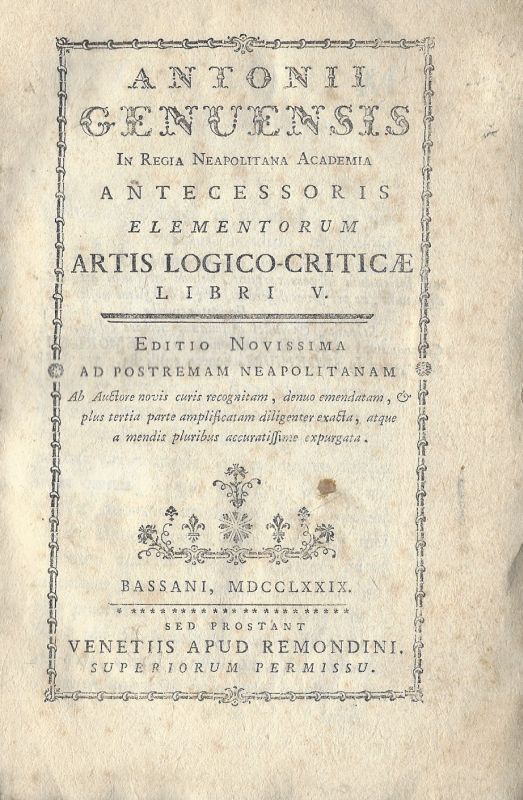Genovesi, Antonii Genuensis in regia Neapolitana Academia Antecessoris Elementor
Antonii Genuensis in regia Neapolitana Academia Antecessoris Elementorum Artis Logico-Criticae Libri V. [Elements of the Art Academy of Naples and Genoa and Anthony Antecessoris Logico-Criticae V.]
Editio Novissima ad Postremam Neapolitanam. Bassani, 1779. 8°. XVI, 352 pages. Softcover. With manuscript annotations on the last page. Binding rubbed and with tear to upper spine.
Antonio Genovesi (November 1, 1712-September 22, 1769) was an Italian writer on philosophy and political economy.
Genovesi was born at Castiglione, near Salerno.
He was educated for the church and after some hesitation, taking orders in 1736 at Salerno where he was appointed professor of eloquence at the theological seminary. During this period of his life he began the study of philosophy, being especially attracted by John Locke’s ideas.[citation needed] Dissatisfied with ecclesiastical life, Genovesi resigned his post, and qualified as an advocate at Rome. Finding law as distasteful as theology, he devoted himself entirely to philosophy, of which he was appointed extraordinary professor in the university of Naples.
His first works were Elementa Metaphysicae (1743 et seq.) and Logica (1745). The former is divided into four parts, Ontosophy, Cosmosophy, Theosophy, Psychosophy, supplemented by a treatise on ethics and a dissertation on first causes. The Logic, an eminently practical work, written from the point of view of Locke, is in five parts, dealing with:
1. The nature of the human mind, its faculties and operations
2. Ideas and their kinds
3. The true and the false, and the various degrees of knowledge
4. Reasoning and argumentation;
5. Method and the ordering of our thoughts
If Genovesi does not take a high rank in philosophy, he deserves the credit of having introduced the new order of ideas into Italy, at the same time preserving a just mean between the two extremes of sensualism and idealism.
Although bitterly opposed by the partisans of scholastic routine, Genovesi found influential patrons. One of them was Bartolomeo Intieri, who in 1754 founded the first European chair of political economy (commerce and mechanics), on condition that Genovesi should be the first professor, at the University of Naples. The fruit of Genovesi’s professorial labours was the Lezioni di Commercio, the first complete and systematic work in Italian on economics.
On the whole he belongs to the Mercantile school, though he does not regard money as the only form of wealth. Specially noteworthy in the Lezioni are the sections on human wants as the foundation of economical theory, on labour as the source of wealth, on personal services as economic factors, and on the united working of the great industrial functions. He advocated freedom of the corn trade, reduction of the number of religious communities, and deprecated regulation of the interest on loans. In the spirit of his age he denounced the relics of medieval institutions, such as entails and tenures in mortmain.
Melchiorre Gioja’s more important treatise owes much to Genovesi’s lectures. (Wikipedia)
Antonio Genovesi (Castiglione del Genovesi, 1º novembre 1713 – Napoli, 22 settembre 1769) è stato uno scrittore, filosofo ed economista italiano
Figlio di Salvatore Genovese, calzolaio, e di Adriana Alfinito di San Mango, nacque a Castiglione nel 1713.
Il padre lo indirizzò in tenera età verso gli studi. A quattordici anni fu affidato agli insegnamenti di Niccolò Genovese, un congiunto, giovane medico tornato da Napoli, il quale lo istruì in filosofia peripatetica per due anni e in quella cartesiana per un anno. A diciotto anni, nel corso degli studi teologici, Genovesi si innamorò di una ragazza di Castiglione, Angela Dragone. Questo amore non trovava l’approvazione del severissimo genitore il quale condusse immediatamente il figlio a Buccino, dove abitavano alcuni parenti, presso il convento dei Padri Agostiniani dove seguì gli insegnamenti teologici e filosofici del prete Giovanni Abbamonte e appassionandosi al latino e al greco.
Ricevette l’ordinazione a diacono dopo aver superato l’esame di teologia dogmatica alla presenza dell’arcivescovo di Salerno Fabrizio di Capua il 22 dicembre 1736, presso la Cattedrale di Salerno. A ventiquattro anni fu nominato maestro di retorica presso il seminario di Salerno dove incontrò il vice rettore, Antonio Doti, dal quale ricevette insegnamenti di lingua francese e lezioni di perfezionamento nel latino e nell’italiano.
Nel 1738, a venticinque anni, venne ordinato sacerdote e, dopo pochi mesi, si trasferì a Napoli. A Napoli fu in stretto contatto con Giambattista Vico e nell’Università di Napoli, nel 1741, ottenne la cattedra di metafisica, cui fu successivamente aggiunta quella di etica. (Wikipedia)
- Keywords: 18.Jahrhundert · 18th Century · 18th Century – Rare · Art – Rare · Catalogue Four – International Art · History of Art – Rare · History of Naples · Italian History – Rare · Naples · Napoli
- Language: Italiano
- Inventory Number: 21904AB
EUR 160,--
© 2025 Inanna Rare Books Ltd. | Powered by HESCOM-Software












